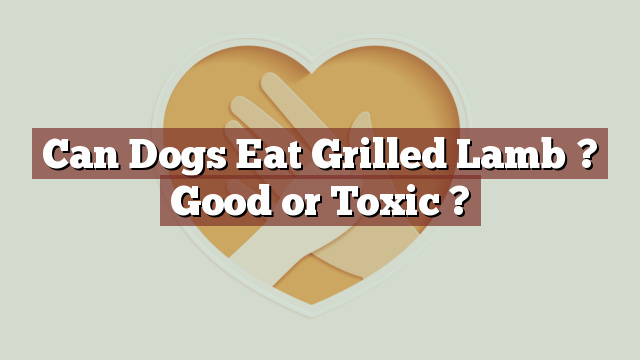Can Dogs Eat Grilled Lamb? Good or Toxic?
When it comes to our furry friends, knowing which foods are safe for them to consume is of utmost importance. Today, we delve into the question of whether dogs can eat grilled lamb and whether it is good or toxic for them.
Nutritional Value of Grilled Lamb for Dogs
Lamb is known for its rich protein content and essential nutrients, making it a popular choice among humans. Similarly, it can provide some nutritional benefits to our canine companions. Grilled lamb is a good source of protein, which is essential for muscle development and overall health in dogs. It also contains vitamins such as niacin, vitamin B12, and zinc, which contribute to a healthy immune system and proper metabolic function.
Is Grilled Lamb Safe or Toxic for Dogs?
Can dogs eat grilled lamb? The answer is yes, but with caution. While cooked lamb can be safe for dogs to consume, there are a few aspects to consider. One important factor is the seasoning or marinade used during the grilling process. Certain spices, such as garlic and onion, can be toxic to dogs and should be avoided. Additionally, bones from grilled lamb can pose a choking hazard and may splinter, causing internal injuries.
It is crucial to note that when introducing any new food to your dog’s diet, including grilled lamb, it’s best to consult with a veterinarian. They can provide personalized advice based on your dog’s specific needs and dietary restrictions.
Potential Risks and Benefits of Dogs Consuming Grilled Lamb
While grilled lamb can offer some nutritional benefits, there are potential risks associated with its consumption. The high fat content in lamb can lead to pancreatitis, a condition characterized by inflammation of the pancreas. Dogs with preexisting digestive issues or those prone to pancreatitis should avoid consuming grilled lamb. Furthermore, excessive consumption of lamb can result in an upset stomach, leading to diarrhea or vomiting.
On the other hand, if grilled lamb is prepared without harmful seasonings and given in moderation, it can offer a protein-rich treat for your dog. Protein is essential for maintaining healthy skin, coat, and muscle tone. However, it is vital to ensure that grilled lamb is not a significant part of your dog’s regular diet, as a balanced and complete dog food is necessary for meeting their nutritional needs.
What to Do if Your Dog Eats Grilled Lamb?
If your dog accidentally consumes grilled lamb, here are a few steps to take:
- Assess the situation: Determine the quantity of grilled lamb consumed and whether any bones were ingested. This information will be helpful when discussing the situation with your veterinarian.
- Monitor for symptoms: Keep an eye out for any signs of discomfort, such as vomiting, diarrhea, or unusual behavior. If any concerning symptoms arise, contact your vet immediately.
- Contact your veterinarian: Reach out to your veterinarian for guidance on whether any further action needs to be taken. They may advise you to monitor your dog closely or bring them in for an examination if necessary.
Conclusion: Grilled Lamb – Proceed with Caution for Canine Consumption
In conclusion, dogs can eat grilled lamb, but with caution. While it can provide nutritional benefits, it is crucial to consider potential risks such as seasoning, bone hazards, and the high fat content. Always consult with your veterinarian before introducing any new food into your dog’s diet. Remember, a balanced and complete dog food is essential for meeting their nutritional needs and ensuring their overall well-being.
Thank you for investing your time in exploring [page_title] on Can-Eat.org. Our goal is to provide readers like you with thorough and reliable information about various dietary topics. Each article, including [page_title], stems from diligent research and a passion for understanding the nuances of our food choices. We believe that knowledge is a vital step towards making informed and healthy decisions. However, while "[page_title]" sheds light on its specific topic, it's crucial to remember that everyone's body reacts differently to foods and dietary changes. What might be beneficial for one person could have different effects on another. Before you consider integrating suggestions or insights from "[page_title]" into your diet, it's always wise to consult with a nutritionist or healthcare professional. Their specialized knowledge ensures that you're making choices best suited to your individual health needs. As you navigate [page_title], be mindful of potential allergies, intolerances, or unique dietary requirements you may have. No singular article can capture the vast diversity of human health, and individualized guidance is invaluable. The content provided in [page_title] serves as a general guide. It is not, by any means, a substitute for personalized medical or nutritional advice. Your health should always be the top priority, and professional guidance is the best path forward. In your journey towards a balanced and nutritious lifestyle, we hope that [page_title] serves as a helpful stepping stone. Remember, informed decisions lead to healthier outcomes. Thank you for trusting Can-Eat.org. Continue exploring, learning, and prioritizing your health. Cheers to a well-informed and healthier future!

